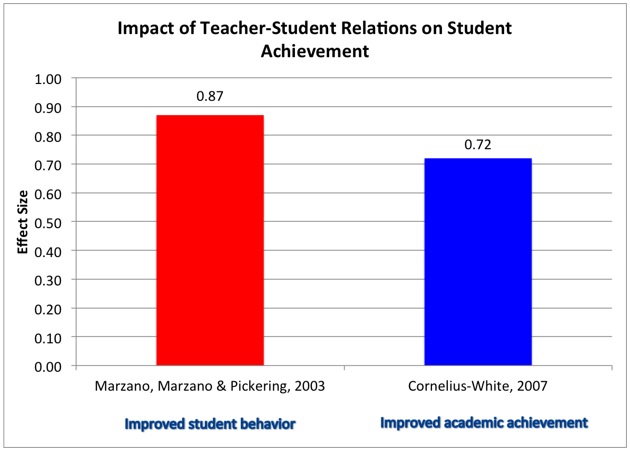Different Friendship Qualities You Must Teach To Your Students For Their Betterment: A Comprehensive Guide
10th November 2023
Teacher plays a vital role in every student’s life not just on an academic level but they also in helping student to thrive in their personal life. However, if the teacher wants to support students they just need to create an inclusive and inclusive learning environment. According to winginstitute.org, we can see that teacher-student relations heavily impact student achievement.

Source: winginstitute.org
As teacher-student relation is important, teachers must need to make sure that students among themselves have a healthy friendship relationship. In this blog post, we will be exploring some essential healthy friendship qualities that must be incorporated in your classroom today to support every student in achieving success in every aspect of their life.
Before moving to the topic, can we ask you a question? Do you follow us on Social Media? We regularly share upgraded educational content, tips, feedback, and more. Check us out by clicking the profiles here - Facebook / Twitter / LinkedIn / Pinterest / Instagram / YouTube
So, without any further delay, let’s get started.
Essential Qualities to Teach For Creating Healthy Friendship In the Classroom
1. Embracing Uniqueness
One of the core aspect of a solid and genuine friendship is understanding each other values and celebrate unique personality trait. They wouldn’t try to change their unqiue personality traits instead of that they accept it and cherish it.
On the other hand, in a non-genuine friendship relation, a toxic friend might try to change or control their friend’s personality attributes, looks, actions and emotions.
As a teacher make sure to teach students about acceptance and equip them to forge real bonds rooted in mutual respect and comprehension.
2. Active Listeners
Those who are real and genuine friends are active listeners. They focus on asking smart questions, and show real interest in their friend’s words. They make a comfortable place for honest talk and make their friends feel respected and important.
On the other side, those who’re not genuine friend might seem like they're listening, but they're just waiting for their chance to talk.
Teachers should focus on teaching crucial abilities to students for great talking and caring connections.
3. Respecting Each Other
Respect is one of the aspects that is very important in every genuine relationship even in friendship. Genuine friends appreciate each other's uniqueness, recognizing their thoughts, desires, and emotions. They highly value each other's time, personal boundaries, and feelings without questioning them. Additionally, they also know the importance of privacy, which refrains them from spreading rumors and private information.
On the other hand, an unhealthy friendship lacks a sense of mutual respect and often leads to intrusive behavior and disregard for personal limits.
Teachers need to make sure to teach about the core value of respect to students, which creates a positive learning environment built on trust, empathy, and mutual admiration.
4. Supporting Each Other
Good friends are those who have each other’s back and always support each other. They are there for each other to celebrate victories, give appreciation, and right beside each other not just in good times but in tough times as well.
On the other hand, in non-genuine friendship, individuals think about themselves and prefer to think about their own interests first and during this, they might even bring their friend’s morale down as well.
It’s very important for teachers to teach about the value of giving support, which will make the person a kind and uplifting individual who can add positivity to other’s people lives.
5. Form Trust-worthy Friendship
Trust is one of the strong pillars of any friendship. In genuine friendship, trust is being nurtured through honesty and open communication over time. When trust is fully formed between friends, feelings of jealousy and tendencies of controlling behaviors are not a concern. Additionally, in a friendship, friends feel secure in their bond and are not bothered if their friends have other friends in their life.
On the other hand, an unhealthy or toxic friendship lacks trust, which often results in controlling behavior and attempts to limit the freedom of the other person. As a teacher, you must educate students, about the importance of trust to form meaningful connections while also developing valuable interpersonal skills.
6. Establishing Fair Treatment
Setting clear boundaries is one of the strong pillars of friendship. Friends should make fair rules about how they want to be treated because in friendship it’s very important to respect each other. For example, a friend might need space in crowded places because they feel anxious. In a good friendship, if a rule is broken, the friend should talk about it and give them another try. But a non-genuine friend ignores these rules, even making fun of their friend.
Teachers should focus on teaching about boundaries so they learn to care for themselves and set good boundaries in all relationships.
7. The Art of Collaboration
Friendship thrives on collaboration and making mutual decisions. Good buddies act like a team, realizing the fact they may have to sacrifice some of their personal desires to foster a win-win situation for each other. This can be as easy as sharing or exchanging turns. Those friends who are not genuine might attempt to dictate and create every rule for their own sake.
It’s every teacher’s responsibility to make sure that they teach students about the significance of mutual agreement which will ultimately teach them about teamwork, empathy, and problem-solving abilities.
8. Letting Go of Resentment
Healthy friendship needs forgiveness. A true friend forgives past mistakes and doesn’t hold any grudges. They know the value of letting go and moving forward to maintain a healthy friendship. On the other hand, a not-so-good friend often reminds you of past blunders. This might make their friend feel bad or guilty.
By showing students that forgiveness is one of the important aspects of maintaining a good friendship, you can ensure that they grow emotionally and see mistakes as an opportunity for growth.
Cultivating Healthy Friendship Quality Among Students Is Necessary
Teaching about friendship is one of the important aspects for every student because not only it will help them to learn about forming bonds with their peers but it also helps them in their academic performance. Those teachers who have pursued courses like Live Online International Teaching Diploma Course know really well about the importance of teaching about friendship to students.
So, start striving to create a positive learning environment in classrooms where students feel supported, respected, and inspired to build lasting, healthy relationships with their peers.
We believe education should be accessible for everyone. That’s why we don’t charge for our blogs. Find the right course that will help you in your career with us, contact us at - + 1800-212-6400. You can mail us at act@asiancollegeofteachers.com.
Written By : Abhishek
Leave a Reply

